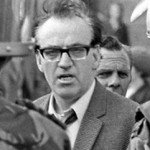More languages
More actions
Seamus Twomey | |
|---|---|
 | |
| Native name | Séamus Ó Tuama |
| Born | 5 November 1919 Belfast, Ireland |
| Died | 12 September 1989 Dublin, Ireland |
| Allegiance | Irish Republic |
| Service/ | Anti-Treaty Irish Republican Army (1937-1969) Provisional Irish Republican Army (from 1969) |
| Rank | Chief of Staff of the Provisional Irish Republican Army (1973 and 1974-1977) |
| Battles/wars | Campaign of Resistance to British Occupation the Troubles |
Seamus Twomey was an Irish Republican military leader in the Anti-Treaty Irish Republican Army and the Provisional Irish Republican Army.
Early Life[edit | edit source]
Seamus Twomey was born in Marchioness Street, Belfast. His father was an Irish Republican Army volunteer. This, combined with Twomey growing up in poverty, contributed to his later radical politics.[1]
Early IRA Membership[edit | edit source]
He joined the Anti-Treaty Irish Republican Army in 1937 and was interned due to his politics.[1]
During this time he lived in Anderstown, Belfast and worked jobs related to bookmaking. He was involved in the forming of a Gaelic Football club in West Belfast in the late 1940s.[1]
In 1946 he married his wife, Rosaleen. They would have three daughters and three sons.[1]
Provisional IRA[edit | edit source]
Twomey was a leader in the Provisional movement within the Anti-Treaty Republicans. The Provisional Irish Republican Army split from the Anti-Treaty Irish Republican Army in December 1969.[1]
In April 1971 he became second-in-command of the Belfast Brigade of the Provisional IRA and in August of that year became commander. He was known for his skill in leadership and along with Dáithí Ó Conaill introduced the car bomb to Northern Ireland.[1]
He was opposed to the 1972 IRA truce, but was a part of the delegation which negotiated with William Whitelaw in London. The talks ultimately failed and the fighting resumed.[1]
He was commander of the Belfast Brigade when it carried out Bloody Friday, where twenty car bombs were set off within one hour.[1]
He opposed the political efforts of some within the Republican movement, aligning with Republican movement leader Seán Mac Stiofáin.[1]
He moved to Dublin in September 1972 and became Provisional IRA Chief of Staff in March 1973. He held the position until his arrest in on 1 September 1973. He was sentenced to three years in prison for his membership in the IRA. He escaped, along with three other Republican prisoners, on 31 October when a hijacked helicopter was flown into the prison.[1]
He became Chief of Staff again in June 1974.[1]
He participated in talks with Protestant church leaders on 12 December 1974. During the subsequent ceasefire throughout 1975 he took the opportunity to regroup the IRA. He addressed the Belfast Easter Rising commemoration that year. Ian Paisley led Unionists objected to this and Paisley leaked documents relating to his IRA leadership.[1]
He spoke of potentially ending the Provisional campaign in early 1976.[1]
He was arrested again in the Republic of Ireland in December 1977, ending of his second and final stint as Chief of Staff of the Provisional IRA. Documents he was carrying at the time of his arrest brought to public attention the 'long war' strategy of the Provisional IRA. He remained in prison until January 1982.[1]
After his release he became the Provisional IRA's Director of Intelligence. He supported the moves towards electoralism by the Northern-led IRA and Sinn Féin leadership of the 1980s.[1]
Twomey died of heart disease in Mater Hospital, Dublin, Ireland on 12 September 1989.[1]
